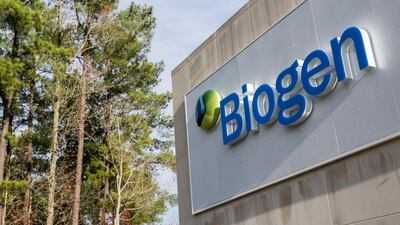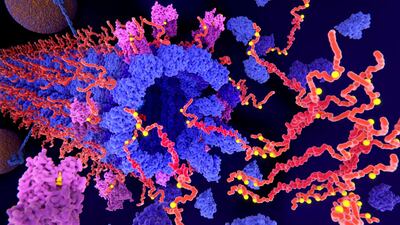Neurological
GLP-1 receptor agonists could play a big role in tackling neurodegeneration and a new academic study has raised expectations of Novo Nordisk’s latest semaglutide Phase III results
Amgen’s Imdelltra for small-cell lung cancer is one of two bispecific T-cell engagers approved for solid tumors, but data at the WCLC meeting show other DLL3-targeting BiTEs may be on the way.
An academic study of GLP-1 agonist showed promise in patients with the painful skin condition but with no signs that the Danish drugmaker will pursue the indication, smaller players in the space may be interested.
As it posts third-quarter numbers that again reveal the decline of revenues from its multiple sclerosis portfolio, the US biotech major is entering into the hot area of targeted protein degradation to boost its immunology and neurology pipeline.
Dalzanemdor missed its primary endpoint in a Phase II Parkinson’s study, Sage announced, following April’s Phase II miss in Alzheimer’s. Phase II data in Huntington’s are still expected this year.
The FDA is scheduled to pronounce on Bristol Myers Squibb’s potential blockbuster on 26 September. But might forthcoming compounds be more effective?
Deal Snapshot: The Belgian company follows a tradition of Western pharma companies relying on local expertise to market their products in China.
Cost watchdog NICE has blocked Leqembi’s use, but a pricing deal could unlock access to the beta-amyloid targeting drug
Discontinuation of the AML study created concern about potential readthrough to a pivotal MDS trial, but the company and analysts pointed out differences in the diseases.
Francesco Hofmann, head of R&D at the mid-sized French group, tells Scrip that its strategy of not playing in the spaces that are dominated by big pharma is paying off.
Nemluvio is a first-in-class IL-31 inhibitor that the US FDA approved for prurigo nodularis.
The group intends to appeal the US FDA’s rejection of its MDMA-based PTSD therapy, midomafetamine, but other psychedelics could advance in the meantime.
After a quiet July, August and September are shaping up to be busy on the approvals front. Already this month, the US FDA has approved Adaptimmune’s Teclera for synovial sarcoma, Phathom’s Voquezna for gastro-esophageal reflux disease and Servier’s Voranigo for gliomas. Here, Scrip takes a look at ten other approvals for novel products in the offing for the third quarter.
The UK firm is weighing up its options for late-stage development of LEVI-04 after unveiling positive Phase II results of Phase II for the neurotrophin-3 inhibitor in moderate-to-severe osteoarthritis.
Deal Snapshot: The Swiss major has given Sangamo a cashflow injection in a deal to access two novel technologies to develop treatments for neurodegenerative diseases, including against tau for Alzheimer's.
In this week's podcast edition of Five Must-Know Things: Pfizer bullish on its oral glp-1; BMS’s rising confidence about Medicare pricing of Eliquis; more long term data for Leqembi; NewAmsterdam’s CETP inhibitor shows promise; and a look at Mankind’s Bharat Serums buy.
The company will cut 65% of its workforce to extend its cash runway and focus its resources on AMT-130 for Huntington's disease and three earlier-stage programs moving into Phase I/II studies.
Leqembi for early Alzheimer’s, Skyclarys for Friedreich’s ataxia and Zurzuvae for postpartum depression meet or exceed Biogen’s internal sales expectations.
The company is hoping to become second to market with a DMD gene therapy after Sarepta’s Elevidys, which recently had a label expansion.
It remains extremely challenging to raise money for start-ups in the neuroscience space that still have little data but the commercial possibilities for those investors prepared to take a punt are huge.
















